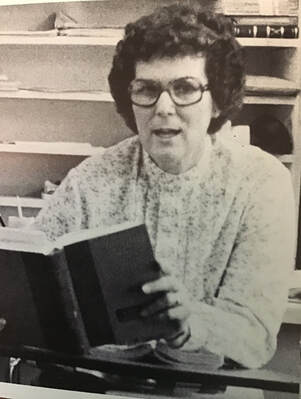|
By Dr. Elizabeth Minerva  Sara Lamar, my favorite high school teacher. Sara Lamar, my favorite high school teacher. My favorite English teacher kept a loaded water gun handy in case a student drifted off during her AP English class. She once removed a spoke-like film reel from its case, tiptoed across the room, and dropped the empty metal canister on the hard floor beside a sleeping student’s desk. We were all delighted, save the startled sleeper. She could be terrifying when she asked a question about one of our assigned books, such as Absalom, Absalom (Faulkner was her favorite). Her bright blue eyes would rove from face to face until she snagged someone. She expected a lot and would push for more if she saw a student verging on a significant realization. In no other class did I think or write as intently as I did during her in-class essays, and this was before I discovered caffeine. Her timed tests were a pure adrenal joy. Sara Lamar was my favorite high school teacher. She knew so much about the literature we read that she made each book seem essential to understanding humanity: James Joyce’s Portrait of the Artist as a Young Man, Alan Paton’s Cry, the Beloved Country, Joseph Conrad’s Heart of Darkness/Secret Sharer, Mark Twain’s The Mysterious Stranger, William Faulkner’s The Sound and the Fury. Each new book was a revelation. She appreciated students’ ingenious ideas in class, guided us when we went off track, and encouraged our individual interpretations. I didn’t talk in class unless called upon. When she did call on me, it was because I was caught in her tractor beam gaze. One morning, Ms. Lamar gave the class a brief task and asked me to talk with her in the hallway. She had noticed that I’d seemed upset all week and wanted to know what was wrong. Voice shaking, I told her that my two-year crush had asked one of my best friends to the prom, which I learned when I called to ask if he wanted to go with me. This travesty led -- a few days later-- to the Latin teacher ordering me and the friend into the hall to deal with whatever was causing our furious note-passing. In the cell phone age, we would have spent the class period jamming our thumbs into our screens; then, our friends passed the folded up sheets of notebook paper hand to hand, all of them in on the conflict. This is a story I tell high school students with some self-deprecating humor (so much angsty material!), but at the time that boy mattered more than anything. Although teachers usually liked me -- quiet, conscientious, a copious taker of notes -- Ms. Lamar was the one who let me know that she saw me. We talked for a few minutes in the hallway. I cried; she listened and offered sympathy. It won’t always be like this, she assured me. When class resumed, I felt better -- not about the boy, but about being heard. My high school years occurred in a very different time. If a student knocked at the door of the teachers’ lounge, a resentful adult would appear in a slice of doorway, puffs of cigarette smoke wafting into the hall. “What is it?” the teacher would say tersely. On the south side of the school, there was a sloping student parking area where you couldn’t see inside the cars through the interior fog (“Freak Hill,” it was called). Freebird… Black and white students played on teams and served in student government together, but interracial dating was rare. Gay students, what? My American History teacher, a middle-aged woman with a perfect, shoulder-length flip, picked fights with our textbook’s prejudicial treatment of the south. Did she actually use the term “war of northern aggression”? Seniors had to pass a one-semester Americanism v. Communism class to graduate (no Bolsheviks in our bathrooms, thank you). I sat near the same people all four years in college prep track classes because alphabetical order was the obvious choice. Robin Montgomery, who often sat in front of or behind me depending on the class, maintained a 25-inch Levi waist size all four years. Although most administrators and teachers at Tallahassee’s Leon High School were kind, intelligent, and devoted, trauma-informed teaching would not have taken root in that red clay soil. If the houses on dirt roads that branched off Henderson Road really did not have central air and heating or other utilities, well, that’s just the way it was. Some people are poor. When baccalaureate was canceled my senior year due to complaints about holding a religious ceremony on school property, a civil war of words erupted; the church/state divide might’ve been legal but it wasn’t tradition. The school’s service clubs -- Key, Anchor, etc -- operated like fraternities and sororities with legacy members; many students who went on to public office started off in those exclusive groups. Life isn’t fair, is it? Deal with it, and hold your head high. We were a pride of lions. My high school was about the size of the one where I now teach in Wichita. My students don’t sit alphabetically in rows of desks, nor do the students in most of the ELA classrooms nearby. While ELA teachers still teach dead white male writers, the offerings are far more diverse these days. In addition, teachers are trained to know what ACES are and how they impact student performance, to recognize suicide warnings, to practice trauma-informed responses to student behavior. Individual relationships with students are essential because, without these connections, we can miss a key aspect of a student’s motivation. If you teach the material but don’t reach the students, what was accomplished? We are in this together and we care about our school community. Pride, Respect, Excellence. We are a sleuth of Grizzlies. When Ms. Lamar called me into the hallway that day, I already knew that she cared about me as a student. We had talked about my college choices. I’d stayed after class, questioning her about comments on my papers. She had supported me when I dropped typing to take Southern Lit with her senior year (the typing teacher was apoplectic -- a girl should have secretarial skills! What if I had children and my husband died and I had to support my family? I would need that second semester of typing). After my freshman year of college, I went back to see Ms. Lamar and she was eager to hear how I liked college, how my English professor had interpreted Faulkner. She had been sure I would enjoy college more than high school, and she was right. What I can take from all this as a teacher is obvious. Any teacher reading this knows how much those moments of recognition mean when a teenager just needs someone to look beyond the curriculum and see their face. My appreciation of Ms. Lamar is a call to be compassionate when students are struggling with life circumstances. Many of my students have far more challenging personal issues than a prom date. Students face serious mental health concerns, either their own or within their families. They might work a ridiculous number of hours at a low-paying job, watch younger siblings, bounce between households without a sense of stability, witness or participate in dangerous, risky behaviors. Schoolwork can be a lost concern when basic needs such as shelter and safety take precedence. Too, a boy or a girl who broke your heart is still cause for distress, as is the disappointing grade, the lunch spent alone in the Commons, the new glasses that no one noticed, the crap day that just keeps going. A moment of kind concern isn’t reserved for traumatic instances. And now, throw in a pandemic. During the COVID-19 crisis, reaching out to students has lacked the face-to-face barometer, the reward of seeing a teen smile or relax when they realize you just want to know how they are. In a professional learning session, a colleague suggested using Remind for short check-ins with students of concern, and I’ve found that to be a simple way to say “hey, how are you? Heard you’re working a lot of hours these days” or in some way let them know they are on my mind. Even students who do not end up turning in work will respond to a short personal inquiry. This isn’t, after all, about the student’s grade. So, I don’t wield a water gun or teach Faulkner, but I do still rely on the example Ms. Sara Lamar set. I see you. You matter to me. Are you okay?  About the Author Lizanne Minerva is an ELA teacher at Northwest High School in Wichita, KS. A native of North Florida, she is a Florida State University graduate.
Melissa
5/13/2020 11:58:15 am
This is a beautiful tribute!
Katie Cramer
5/20/2020 02:08:39 pm
Lovely story and delightfully written! Thank you for reminding us all about the importance of seeing and connecting with each of our students, now especially. Comments are closed.
|
Message from the EditorWelcome! We're glad you are here! Archives
April 2024
Categories
All
|
 RSS Feed
RSS Feed